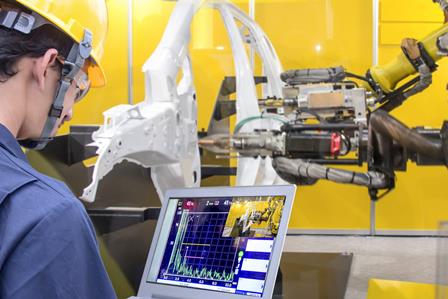Course Overview
This professional development course is designed for engineers and technicians who need practical knowledge in the design and troubleshooting of Industrial Ethernet networks, as well as the selection, installation, and configuration of components such as routers and switches.
Industrial Networking Course Benefits
- You may be eligible to claim CPD points through your local engineering association.
- Receive a Certificate of Completion from EIT.
- Learn from well-known faculty and industry experts from around the globe.
- Flexibility of attending anytime from anywhere, even when you are working full-time.
- Interact with industry experts during the webinars and get the latest updates/announcements on the subject.
- Experience a global learning with students from various backgrounds and experience which is a great networking opportunity.
- Gain practical knowledge in the field of designing and troubleshooting of Industrial Ethernet networks, as well as the selection, installation, and configuration of components such as routers and switches.
- Get in-depth knowledge on TCP/IP protocols and learn how to addresses design and configuration issues related to IPv4 and the more recent IPv6.
- Learn about advanced practical aspects and applications of Industrial Ethernet components such as advanced switching and routing, Modbus, CCTV over IP, Intrinsically Safe applications, Industrial Security, and highly deterministic Ethernet-based field buses.
This course deals in-depth with the underlying TCP/IP protocols, and specifically addresses both design and configuration issues related to IPv4 and the more recent IPv6.
It also covers the more advanced aspects and applications of Ethernet such as advanced switching and routing, CCTV over IP, Modbus, Industrial Security, Intrinsically Safe applications, switched rings (including the latest IEC 62439-3 redundant ring standard), and highly-deterministic Ethernet-based field buses (e.g., for servo control) capable of 1-millisecond repetition rates and jitter of less than 1 microsecond. It is highly practical, with access to remote laboratories and cutting-edge simulation software, allowing you to achieve hands-on outcomes.
The course is composed of 12 modules, covering the design and troubleshooting of Industrial Ethernet networks, as well as the selection, installation, and configuration of components such as routers and switches.
Module 1: Network Interface Layer: Ethernet
- Frame structure and MAC addresses
- Bluebook (V2) vs. IEEE 802.3
- Variants (10 M bps Ethernet, Fast Ethernet, GbE, 10GbE, 100GbE)
- Industrial Ethernet
- Intrinsically safe (Ex) Ethernet
- Power over Ethernet (PoE) (IEEE 802.3af, IEEE 802.11at)
- Point-to-Point Protocol over Ethernet (PPPoE)
Module 2: Network Layer Protocols: IPv4
- Datagram structure and protocol header
- Address structure and classes
- Subnet mask and default gateway
- Private addressing schemes
- ARP and ICMP
Module 3: Network Layer Protocols: IPv6
- Datagram structure, protocol header, and header extensions
- Address structure: multicast, unicast and anycast addresses
- Address scope
- ICMPv6
Module 4: Host-to-Host and Application Layer Protocols
- Connectionless vs. Connection-oriented communication
- Ports and sockets
- TCP operation, connections, header structure
- UDP operation, header structure
- HTTP and FTP
- DNS and DynDNS
- SNMP
- DHCP, BootP and APIPA
Module 5: Switching
- Mechanics of switching
- Hubs vs. switches
- Bridging vs. switching
- Managed vs. unmanaged switches
- L2 vs. L3 switching
- Spanning Tree protocols (STP, R STP, M STP, SPB)
Module 6: Advanced Switching
- VLANs and port prioritization (IEEE 802.1p/Q)
- QoS and DiffServ
- Switch rings and associated protocols
- Parallel Redundancy Protocol (IEC 62439-3)
- Port-based authentication (IEEE 802.1X)
- Link aggregation/trunking (Etherchannel, IEEE 802.3ad)
Module 7: Routing
- Mechanics of routing
- VLSM and CIDR
- Subnetting
- Virtual mapping (NAT) and masquerading
- Port forwarding
Module 8: Advanced Routing
- Autonomous Systems (ASSs)
- Routing metrics
- Interior Gateway Protocols (RIPv2, EIGRP, IS-IS, O SPF)
- Exterior Gateway Protocols (BGPv4)
- Multi-Protocol Label Switching (MPLS)
Module 9: CCTV Over IP
- Analog vs. IP cameras
- Compression (JPEG, M PEG4, H.264)
- Bandwidth requirements
- LAN/WAN infrastructure
Module 10: Ethernet in Industrial Applications
- Modbus serial over Ethernet
- Modbus/TCP
- OPC
- Ethernet-based Fieldbuses:
- CC-Link IE
- EtherCAT
- Ethernet/IP
- EPL
Module 11: Security
- Access Control Lists (ACLs)
- MAC address, port, and protocol filtering
- Stateful Packet Inspection (SPI)
- VPNs (IPSec and VTUN)
- Authentication: IEEE 802.1x/EAP, LEPS
- Security Data Sheets (SDSs)
- Encryption: AES, TKIP
- Secure Shell (SSH) tunneling
- Firewalls
- DoS (Denial of Service) protection
Module 12: Wireless
- Wireless Ethernet backhauls
- Ethernet modems for PtP and PtMP applications
- IEEE 802.11: Industrial WLANs
- IEEE 802.15.4: Industrial mesh networks
- Authentication: IEEE 802.11i (WEP, WPA, WPA2)
To obtain a certificate of completion for EIT’s Professional Certificate of Competency, students must achieve a 65% attendance rate at the live, online fortnightly webinars. Detailed summaries/notes can be submitted in lieu of attendance. In addition, students must obtain a mark of 60% in the set assignments which could take the form of written assignments and practical assignments. Students must also obtain a mark of 100% in quizzes. If a student does not achieve the required score, they will be given an opportunity to resubmit the assignment to obtain the required score.
For full current fees in your country go to the drop down filter at the top of this page or visit the Fees page.
Payment Methods
Learn more about payment methods, including payment terms & conditions and additional non-tuition fees.
Deon Reynders is an electronics engineer with over 40 years postgraduate experience encompassing middle management, engineering consulting, management consulting, hardware and software development, systems engineering, project management, marketing, and industrial relations.
Learn about our instructors.
This course may use the following software:
- Server
- Kepware DA
- OPCClient
Due to ongoing unit and course reviews, software may change from the list provided. Learn more about the Practical Learning at EIT here
You are expected to spend approximately 5-8 hours per week learning the course content. This includes attending fortnightly webinars that run for about 90 minutes to facilitate class discussion and allow you to ask questions. This program has a 65% attendance requirement in the live webinars in order to graduate from the program. If you are unable to attend the live webinars, you have the option of watching the recording of completed webinars and sending a summary of what you have learnt from the webinar to the Learning Support officer. The summaries go towards your attendance requirement for the program.
This program is run online on an intensive part-time basis and has been designed to fit around full-time work. It will take three months to complete.
We understand that sometimes work commitments and personal circumstances can get in the way of your studies, so if at any point you feel that you are struggling with the pace of the course or finding a particular module challenging, you are encouraged to contact your designated Learning Support Officer for assistance.
Registrations are open for our upcoming intakes. Please ensure you book your place at least one week before the start date of the program.
Hear from our students
Choose Your Next Step
Tick the box that applies to you:








